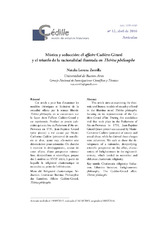Mística y seducción: el affaire Cadière-Girard y el triunfo de la racionalidad ilustrada en Thérèse philosophe
Autor
Zorrilla, Natalia Lorena
Editor
UCOPressFecha
2016Materia
Religiosité charismatiqueSéduction
Littérature libertine
Philosophie des Lumières
Affaire Cadière-Girard
Thérèse philosophe
Charismatic religiosity
Seduction
Libertine literature
Enlightenment philosophy
The Cadière-Girard affair
METS:
Mostrar el registro METSPREMIS:
Mostrar el registro PREMISMetadatos
Mostrar el registro completo del ítemResumen
Cet article a pour but d’examiner les modèles théoriques et littéraires de la sexualité offerts par le roman libertin Thérèse philosophe, en se concentrant sur la façon dont l’affaire Cadière-Girard y est représentée. Pendant ce procès judiciaire qui a eu lieu au Parlement d’Aix-en-Provence en 1731, Jean-Baptiste Girard (père jésuite) a été accusé par Marie-Catherine Cadière (pénitente) de sorcellerie et abus, ayant reçu elle-même une dénonciation pour calomnies. On cherche à montrer le développement, autour de cette affaire, d’une perspective rationaliste, démystifiante et scientifique, propre des Lumières au XVIIIe siècle, à partir de laquelle la religiosité charismatique se neutralise au point de l’oblitération. This article aims at examining the theoretic and literary models of sexuality offered in the libertine novel Thérèse philosophe, focusing on its representation of the Cadière-Girard affair. During this scandalous trial that took place in the Parliament of Aix-en-Provence in 1731, Jean-Baptiste Girard (Jesuit priest) was accused by Marie-Catherine Cadière (penitent) of sorcery and sexual abuse, while he claimed these charges were calumnies. We seek to show the development of a rationalist, demystifying, scientific perspective on this affair, characteristic of Enlightenment in the eighteenth century, which tended to neutralize and obliterate charismatic religiosity.

